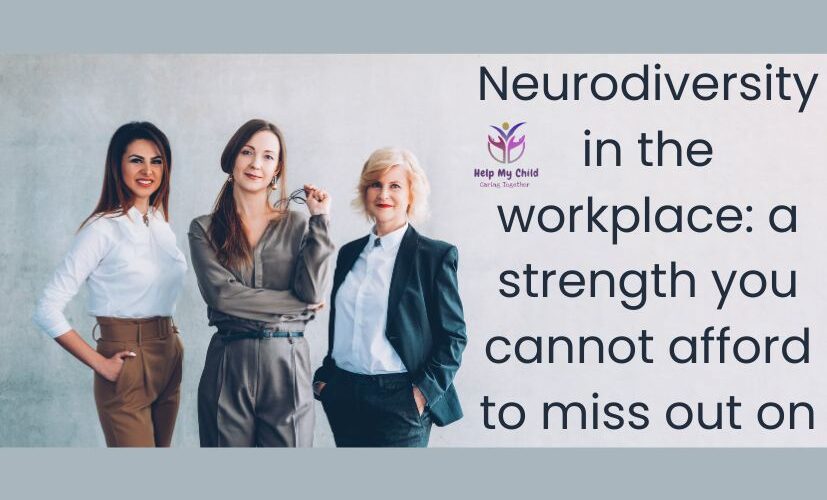Blog
Archaic Policies Expel Women And Neurodivergent Minds – At Great Cost!
- May 30, 2025
- Posted by: Jouré Rustemeyer
- Category: ADHD Executive Function Neurodivergent Technology

Why Creating Inclusive Workplaces for Women Also Supports Neurodivergent Talent Insights from the 2025 Working Women in South Africa Report
The recently released Working Women in South Africa Report 2025 by RecruitMyMom highlights the real experiences, challenges, and priorities of over 3,700 skilled South African women in the workforce. As organisations seek to retain top talent and build more inclusive cultures, this report offers valuable insights that intersect meaningfully with another often-overlooked group in the workplace: neurodivergent professionals.
At HELP MY CHILD , we believe that the changes women are asking for—flexibility, support, career progression—are not only essential for gender equity, but are also aligned with the conditions that help neurodivergent employees thrive. Below, we explore the key findings of the report and how they link directly to strategies taught in our CPD-accredited course, Neurodiversity in the Workplace: A Strength-Based Approach.
Key Findings from the 2025 Report
- 1. Financial security is a top priority: 74% of working women cite financial stability as their main motivator for employment. 41% are sole income earners, many of them single mothers.
- 2. Flexibility is non-negotiable: 94% of women prefer hybrid or remote work. Despite this, almost half are still office-bound.
- 3. Return-to-office mandates are pushing women out: Among women experiencing increased in-office time, 84% are actively job hunting.
- 4. Career growth matters deeply: 84% of women want career progression, but many face barriers like inflexible policies, lack of mentorship, and internal stagnation.
- 5. Loyalty is high when needs are met: 65% of women stay with one employer for 3–10 years, well above the national average.
- 6. Promotion gaps persist for Black women: After five years in a role, Black women are less likely to be promoted to senior positions.
- 7. Benefits matter: Medical aid, pension contributions, bonuses, and ongoing training are consistently rated as the most valued employee benefits.
What This Means for Employers—and Why Neurodivergent Inclusion Belongs in the Conversation
The findings in this report are not just about gender—they speak to the broader need for more inclusive, responsive, and human-centred workplaces. Many of the same barriers experienced by women are also experienced by neurodivergent employees, especially those who are undiagnosed or late-diagnosed.
Here’s how these insights link directly to neurodiversity in the workplace:
1. Flexibility Supports Everyone—Not Just Women

Flexible work environments reduce stress, allow for better sensory regulation, and help those with executive function challenges to manage their workload more sustainably.
This doesn’t mean that flexible work leads to missed deadlines or reduced productivity. In fact, research consistently shows the opposite. A 2023 report by Microsoft and Boston Consulting Group found that remote workers were often more productive and focused, especially when their work environment aligned with their personal needs. For neurodivergent professionals—particularly women who may rely heavily on masking in traditional office settings—flexibility is not a luxury, it’s a performance enabler. Masking requires significant mental energy, often leaving little room for creative or strategic thinking. When neurodivergent women are able to work in environments where they don’t need to hide who they are, they deliver higher quality work more efficiently.
Building flexibility into workplace culture benefits employers as much as employees. It increases retention, reduces burnout, and improves output—especially among neurodivergent and female staff who might otherwise struggle in rigid environments. When companies remove unnecessary stressors and support autonomy, they unlock their teams’ full potential—boosting not only employee wellbeing but also innovation, loyalty, and ultimately, the bottom line
When companies build flexibility into their culture, both women and neurodivergent employees are more likely to stay and thrive.
“Just as flexible work policies retain skilled women, they also reduce burnout and executive dysfunction in neurodivergent employees.”
2. Career Progression Requires Inclusion

Neurodivergent professionals often face barriers to advancement due to masking, social fatigue, or misinterpretation of communication styles. Like the women in the report, they may be overlooked for promotion despite loyalty and competence. Inclusion here means recognising different working styles as legitimate—not requiring conformity.
The skillsets of neurodivergent women are not just valuable—they’re increasingly recognised as essential in today’s evolving workplace. Many companies are now actively recruiting for the very strengths these professionals bring: creative problem-solving, pattern recognition, deep focus, innovative thinking, and high empathy. When organisations make space for diverse cognitive styles and create environments where neurodivergent women can grow and lead, they don’t just promote inclusion—they build resilience, adaptability, and long-term success into the core of their employees, and thus their business.
“Mentorship and clear progression paths are vital for retaining both women and neurodivergent employees—especially those masking or navigating executive challenges.”
3. Late-Diagnosed Women Are in Your Workforce Now

Many women are only diagnosed with ADHD or autism in adulthood—often after years of being misunderstood in the workplace. Far from underperforming, these women are frequently the overachievers: putting in longer hours, maintaining intense focus, and demonstrating exceptional attention to detail. But the effort required to sustain this level of output—while navigating environments not designed with their needs in mind—can quietly take its toll.
When these women are properly supported, the difference is remarkable. They’re not just capable—they thrive. With the right understanding and flexibility, they can work more sustainably, contribute more creatively, and maintain long-term engagement. For employers, this means enhanced performance, reduced burnout, and the retention of highly skilled, dedicated professionals.
“Many late-diagnosed women are already in your workforce—masking, overcompensating, and quietly burning out. Inclusive practices are not a ‘nice-to-have’—they are a retention strategy.”
4. Supportive Workplaces = Retention

Just as women are loyal when their needs are met, neurodivergent employees are more likely to remain and grow in organisations that prioritise psychological safety, flexibility, and clear communication. These aren’t just feel-good policies—they’re smart business strategies. Long-term employees bring institutional knowledge, deeper client relationships, and higher-quality outputs. A study by the Corporate Leadership Council found that highly engaged employees are 87% less likely to leave their organisations, and their productivity can be more than 20% higher than that of disengaged peers.
Companies like SAP, Microsoft, and EY—all of which have robust neurodiversity hiring initiatives—report not only increased innovation but also higher retention rates and improved team morale when neurodivergent staff are supported effectively. Retaining these employees doesn’t just save on recruitment and training costs; it fosters continuity, collaboration, and trust—foundations of high-performing teams.
The return on investing in inclusive, supportive workplace culture is clear: a more stable, resilient, and empathetic workforce that drives long-term value and competitive advantage.
“Supporting neurodivergent talent is not just about equity—it’s about retaining high-calibre employees and future-proofing your leadership pipeline.”
5. Benefits That Really Matter

Training, mentorship, and support for mental wellbeing aren’t just perks—they are the foundation of a sustainable, high-functioning workplace. Our course, Neurodiversity in the Workplace: A Strength-Based Approach, goes beyond awareness. It offers practical, real-world strategies that HR professionals, managers, and team leaders can implement immediately—strategies grounded in current research and enriched by lived experience.
This course doesn’t just help companies meet compliance goals or tick inclusion boxes. It helps them grow, evolve, and achieve more than they ever imagined—by unlocking the full potential of a workforce that thinks differently. If organisations want the benefits of “out-of-the-box” thinking, they must first be willing to step out of their own. That means shifting outdated assumptions, redesigning systems for flexibility, and leading with curiosity rather than control. The payoff? Greater innovation, stronger teams, and a more adaptable business—ready for whatever comes next.
Final Thoughts
The Working Women in South Africa Report 2025 is a powerful reminder that inclusive workplace design is not just good for women—it’s good for everyone, especially neurodivergent professionals who often remain unseen in standard HR practices.
If your business is serious about inclusion, flexibility, and retaining talent, it’s time to expand the conversation. Our course, Neurodiversity in the Workplace: A Strength-Based Approach, is designed to equip your team with the tools to recognise, support, and retain neurodivergent individuals—not out of charity, but because it’s smart, sustainable business.

